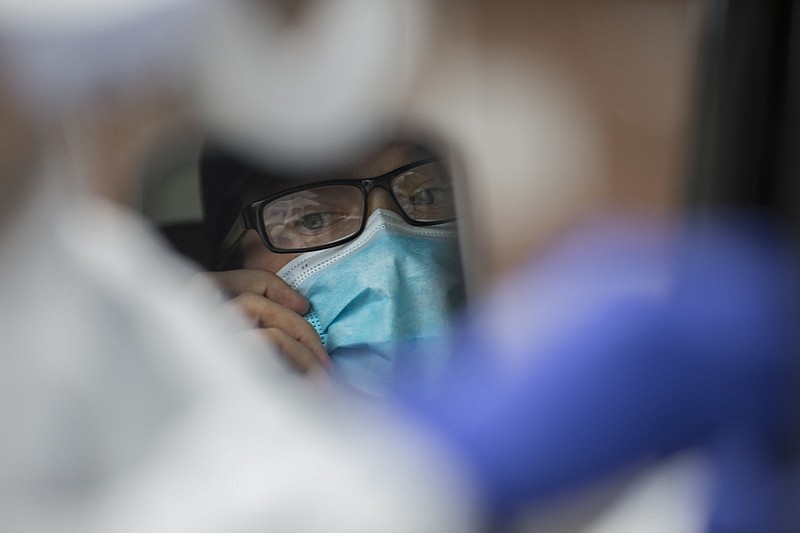While Tennessee continues to ease restrictions and people become more mobile, while many residents reject calls from public health officials to wear masks, the work of contact tracers for COVID-19 is becoming increasingly difficult.
Dawn Ford, a clinical associate professor for the University of Tennessee at Chattanooga's master of public health program, has trained around 100 students, faculty and staff at UTC to be contact tracers.
When a positive case is reported by the health department, the UTC workers will receive a list of contacts the person with the positive case may have infected. The workers then try to make contact with everyone by phone or text to tell those who have been potentially exposed to quarantine for two weeks.
The health department now employs 28 investigators, said Becky Barnes, Hamilton County Health Department administrator. Next week, the department will start using a state-contracted service to assist when there are local surges in cases, she said.
"We have encountered individuals that are positive that have more contacts than we have had in the past," Barnes said this week. "Clearly, when almost the entire country was shut down, people didn't have a lot of options. We have had people with more contacts, which is more of a challenge."
(READ MORE: New York Times ranks Chattanooga as No. 2 in growth rate for COVID-19 deaths)
The UTC program began when Hamilton County had several dozen confirmed COVID-19 cases. Now, with more than 2,200 cases and people less willing to remain socially distant, contact tracers face a greater challenge. Unlike before, the workers are getting contact lists from parties or graduation events, Ford said.
"One thing that has stood out to me is that it's getting harder to reach people," she said. "They are not answering their phone. Unfortunately they don't know that they've been exposed to a case or they know it but they don't want to be interviewed, so they are unaware that they are under quarantine. So they may go about their business as normal, when they could in fact be spreading the disease."
The challenge in tracing is not just a local problem. Dr. Lisa Piercey, Tennessee health commissioner, said that in the early months of the pandemic most people were infected by someone they knew - such as through a household contact or from a coworker. Now, 50% of cases in the state cannot be traced.
"As people are moving about in the community, they come into contact with people that are sick that they're unaware of. But this unknown source tells us we have more community spread," Piercey said.
In Hamilton County, 44% of the cases are epidemiologically linked - meaning the infection can be connected to a previously reported positive case - according to the health department.
Linking cases is one of several data points - including hospitalizations and a seven-day moving average of new cases - that people should monitor to gauge whether the pandemic is worsening, said Dr. Marie Griffin, director of the Vanderbilt University master of public health program.
Hospitalizations and the seven-day moving average in Hamilton County are lower than at the start of the month, although deaths in the county have spiked in the past week. June is already the deadliest month for COVID-19 in Chattanooga, as 14 of the region's 29 total deaths during the pandemic have been reported since June 1.
Cities across the country are struggling with contact tracing, Griffin said. Due to privacy concerns, the United States has rejected tools like cell phone monitoring to track cases, a strategy used in China.
(READ MORE: Hamilton County reports second child death from coronavirus)
"In the United States, generally, we're using the very blunt tool of social distancing and telling people to stay home instead of focusing more on areas where there are more cases or where the risk is higher," she said.
Face masks - which can stop the spread of respiratory droplets released by people with the virus - are one of the most effective means of stopping the spread, but Tennesseans are among the least likely Americans to wear them.
Griffin urged people to get tested as soon as they think they are sick. Any delay in getting tested can result in further spread, she said.
"A big issue is that people don't get tested until they are ill for three or four days," Griffin said. "Then they get tested and it's three or four more days before they get the results back. And then it's another day before the health department calls them. So it's a week delay before the health department calls them and they might not be sick anymore."
Since the pandemic began in March, the health department has been able to contact 96% of positive cases in Hamilton County, Barnes said. However, knowing who infected that person and where possible hotspots are emerging remain a challenge, as seen in the county's 44% rate of being able to link cases.
Contact Wyatt Massey at wmassey@timesfreepress.com or 423-757-6249. Follow him on Twitter @news4mass.
